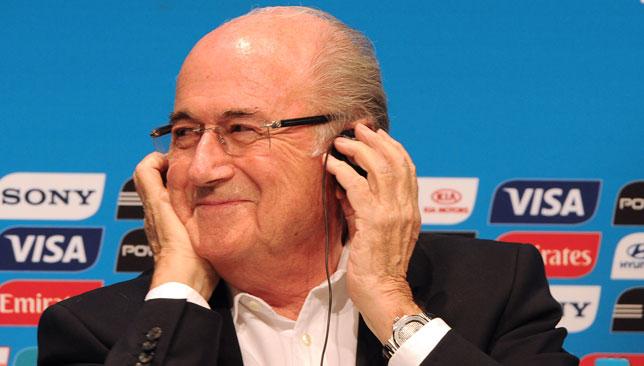
It is often easy not to take Sepp Blatter seriously. He’s encouraged female footballers to wear tighter shorts, has wanted the size of goals increased, the offside rule scrapped and also claimed racism can be cured with a handshake.
His list of gaffes are as long and varied as his 16-year FIFA presidency but the problem is, when Blatter speaks, we have to take him seriously because he is the most powerful man in football.
Amid his declaration that he will stand for a fifth term, Blatter – who will be 83 by 2019 – also offered his views on a number of issues in the game. There was Russia 2018, Qatar 2022 and some barbs at the English FA, but most interesting, and something that could change football well beyond his next four years in office, is his plan to give managers the option to challenge referees’ decisions during a game.
For someone who in December 2009 said: “Please do not insist on the technology”, Blatter has certainly now seen the light. Goalline technology, so far, has largely proven it’s worth but then the danger with such a revolutionary change to how the game is officiated is that it opens the floodgates for more of the same.
In the list of problems within the game: unfair financial distribution, corruption in national associations and leagues, racism, sexism, agent malpractice and match fixing, the occasional erroneous decision making of officials is reasonably far down. Yet it’s something Blatter wants to address, again.
He doesn’t want to take everything out of the referee’s hands, instead it will be a consultation where the manager views the challenged incident on a replay and the referee’s decision will be final.
But managers will see what they want to see and defend their opinions to the hilt. It will take an act of honesty – something seldom seen in the professional game – after challenging any decision to then admit they were wrong.
Life will not become easier for officials, it will become considerably more stressful, never mind potentially destroying their reputation in the space of one game as the importance of each call now blown up beyond all sensible proportion. Marginal calls, where interpretation of the rules can be applied – rules not all managers are 100 per cent clued up on – will certainly see the definition of the word ‘discussion’ stretched.
Testing this at the Under-20 World Cup will not be mimicking the intense pressure of a Clasico, a Manchester derby or Bayern Munich versus Borussia Dortmund and the subsequent heightened emotions on the touchline. And how long before managers start asking for three challenges a half? One or two seems unfair, given there’s not a great deal of margin for error. There is nothing wrong with borrowing from other sports, but rugby and cricket still have their problems with video technology and its accuracy, and they are sports that can accommodate regular stoppages with little disruption to the ebb and flow of a game.
Blatter enjoys building his legacy on the idea he has promoted the idea of an all-encompassing global game. Yet by introducing a fundamental alteration in the rules, with the requisite that TV cameras must be present, you are creating a two-tier sport between those matches deemed important enough for broadcast and those that are not.
But then, as is the case so often with FIFA’s president, little makes sense, or seems to add up. It would be funny if it wasn’t so serious.